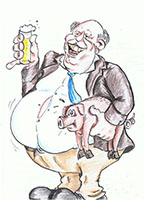| Seite 9 |
Übung 12-9a In BOLT.
Video: Deutschlandlabor: "Kunst".
Fragen zum Video
- Wie heißen die Moderatoren im Video?
- Welche zwei Fragen stellen die Moderatoren am Anfang des Videos?
- Wieviele Kunstmuseen gibt es in Deutschland?
- Was für Kunstarten stellen Museen aus?
- Wo sind die berühmtesten und größten Museen?
- Wie heißt das erste Museum, das die Moderatoren besuchen?
- In welcher Stadt ist dieses Museum?
- Wo wurden viele Künstler, deren Werke im Museum sind, ausgebildet?
- Wie heißt das zweite Museum, das die Moderatoren besuchen?
- Wer war der Mann, nach dem das Museum benannt wurde?
- In welcher Stadt ist dieses Museum?
- Wie ist der Titel des Gemäldes, das der Museumdirektor den Moderatoren zeigt?
- Was kann man von der Kunst lernen? (Wie antwortet der Museumdirektor auf diese Frage?)
- Was braucht man, um selber Kunst zu machen?
"Da+Präposition"
The so-called "da-compounds" are the counterpart to the "wo-compounds". The verb + preposition collocations apply here as well. In this case, da means "that" or "it": damit = "with that" (Not to be confused with the conjunction damit, which means "so that".), dafür = "for that", and so forth. For example: Wir können darauf verzichten. = We can do without that. Viele Leute freuen sich darüber. = A lot of people are happy about it.
So in German, one does not say *für das or *mit es. That is just not German.
Übung 12-9b In BOLT. Respond to the questions with the appropriate "da-compound" in a complete sentence.
Beispiel: Arbeiten Sie noch an Ihrer Dissertation? → Ja, ich arbeite noch daran. See the list of verb + preposition collations "auf Seite 11".
Beispiel: Freuen Sie sich auf Ihren Geburtstag? → Ja, ich freue mich darauf.
- Freuen Sie sich auf Ihren Urlaub in Italien?
- Erinnern Sie noch an Ihre Kindheit?
- Haben Sie sich auf das Klima in Spanien gewönt?
- Leiden Sie immer noch an Magenschmerzen?
- Warten Sie auf neue politische Verhältnisse?
- Werden Sie bei Ihrem Versprechen bleiben?
- Haben Sie sich gestern mit Ihrer Arbeit beschäftigt?
- Denken Sie oft über Ihr Leben nach?
- Haben Sie sich um Vergebnis gebeten?
- Hat man Sie nicht vor den Gefahren gewarnt?
"Da+Präposition" 2
The "da-compounds" serve another vital function. Above the "da-compounds" are a kind of pronoun that stand for things. So in the question-answer "Freuen Sie sich auf Ihren Geburtstag? → Ja, ich freue mich darauf", "darauf" stands for the word birthday.
The "da-compound" can also stand for an action or event expressed in a sentence clause. For example, instead of looking forward to one's birthday, one could just as well express it as "looking forward to celebrating" a birthday. The German in this example: Ich freue mich darauf, dass ich am Montag meinen Geburtstag feiern werde." In this case, darauf keeps the same meaning, but in reference to the entire clause after dass. The "da-compound" in such sentences is called a correlative.
The "da-compound" + the conjunction dass. Other conjunctions besides dass can be used in correlative constructions, but those will be dealt with on a case-by-case basis.
Übung 12-9b In BOLT. Combine the pairs of sentences as correlative statements.
Beispiel: Die Straßen sind bei Nacht gefährlich. Die Polizei hat die Öffentlichkeit gewarnt. → Die Polizei hat die Öffentlichkeit davor gewarnt, dass
die Straßen bei Nacht gefährlich sind. Because the structures are so different from English, it will also be necessary to translate the German into English to check comprehension.
The police warned the public that the streets at night are dangerous.
- Autofahrer müssen achten. Sie fahren nicht so schnell auf den Seitenstraßen.
- Bernds Mutter hat sehnlichst gehofft. Er und seine Frau bekommen endlich ein Kind.
- David begeister sich sehr. Seine Lieblingsband kommt nach Stuttgart.
- Die Einwohner wollen sich schützen. Neonazis ziehen nicht in ihren Stadtteil ein.
- Die Lehrer und Lehrerinnen zweifeln nicht. Paula wird Klassenersterin.
- Die Studenten / Studentinnen klagen sich. Es gibt nicht genug Zeit für ihre Forschungsprojekte.
- Die Verwaltung und Lehrerschaft fürchten sich. Die externe Politik mischt sich in die Angelegenheiten der Hochschulen.
- Sara hat sich nicht gewöhnt. Ihre Mitbewohnerinnen immer sehr spät nach Hause kommen.
- Viele Leute in der Stadt leiden. Das Trinkwasser von Chemikalien verseucht ist.
- Wir danken den Gästen. Sie haben den Festsaal sehr gut aufgerämt.
- Wir können seine Ehrlichkeit erkennen. Er hat uns nie belogen.
Classical Theater "effaces the medium," while a modernist text "lays bare the device."
- A classical narrative is high disclosure (it gives you most of the information you need to reconstruct the story out of the plot), while a modernist narrative is low disclosure (makes you do work to reconstruct one possible story out of the plot).
- Classical narratives feature unquestionably reliable narrators, while modernist narratives question how we can know the truth by privileging unreliable narrators.
- A classical narrative seals off the story from the real world, while the modernist narrative breaks the seal and speaks to what is happening in the real world.
Brecht revolutionized theater at both the aesthetic and ideological levels. For Brecht, these two levels are intricately bound together. Traditional theater meant to entertain and passify its paying audience members. Brecht believed that the classical theater was fully supporting an oppressive class system through both its aesthetic and ideological practices. This is very clear in the video clip from Die Dreigroschenoper.
Brecht called his approach "epic" theater, as opposed to "culinary" (consumer) theater. Culinary theater is for Brecht escapist and emotional; his epic theater intended to allow the spectator distance to reflect on the broader meaning of what was going on. He referred to this as the "alienation effect". That is why Brecht's characters step out of character to directly address the audience, why they use placards and other forms of writing which analyze the plot material, and use songs which comment upon the dramatic events. Songs were especially important to Brecht and they were used to deliver the message.
For The Threepenny Opera, Brecht and Weill adapted a 1728 musical by John Gay, entitled, The Beggar's Opera. Brecht transforms the material into a class-based critique on the middle-class, who exploit and oppress the proletariat, working-class. Capitalism, in this view, creates a system that functions as a kind of organized crime.
The play's theme is best summarized in the song "Wovon lebt der Mensch".
See the video: Wovon lebt der Mensch
Here the German and English parallel text for the song:
|
Macheath: Ihr Herrn, die ihr uns lehrt, wie man brav leben Und Sünd und Missetat vermeiden kann Zuerst müßt ihr uns was zu fressen geben Dann könnt ihr reden: damit fängt es an.
Ihr, die euren Wanst und unsre Bravheit liebt
Jenny:
Macheath:
Denn wovon lebt der Mensch? Indem er stündlich
Chor: |
Macheath: You gentlemen who tell us how to live properly, And how to avoid all sins and crime, Must first make sure that we have food to eat. Then you can talk, that's where it begins.
You who love your paunch and our good behavior,
Jenny:
Macheath:
Chorus: |

Übung 12-9d: Über Irreales sprechen

Das ist Reiner Reichenbach.
Das wissen wir alles über ihn: Kreuzen Sie zuerst Ihre Antworten an.
Angenommen, Sie wären Reiner. Würden Sie genauso handeln wie er?
| Das würde ich nicht tun. | Das würde ich tun. | Er/Sie würde das nicht tun. | Er/Sie würde das tun. | |
|---|---|---|---|---|
| Er hat Fieber, aber trotzdem bleibt er nicht in Bett. | ||||
| Er ist verheiratet, aber er tanzt mit anderen Frauen. | ||||
| Seine Mutter ist zu Besuch, trotzdem geht her allein ins Kino. | ||||
| Er hat ein Auto, aber trotzdem fährt er mit dem Bus. | ||||
| Es regnet, aber trotzdem geht er spazieren. | ||||
| Er hat wenig Geld, aber trotzdem fährt er im Urlaub ins Ausland. | ||||
| Er kann nicht schwimmen, aber trotzdem fährt er gern zum Strand. | ||||
| Er soll eine Diät machen, aber trotzdem isst er fast jeden Tag Kuchen. | ||||
| Er hat eine Brille, aber trotzdem setzt sie nie auf. | ||||
| Seine Nachbarn machen manchmal abends Krach, aber er beschwert sich nie. |
Und Ihr Partner / Ihre Partnerin? Wie würde er/sie handeln? Fragen Sie Ihren Partner / Ihre Partnerin.
- Würdest du auch nicht im Bett bleiben, wenn du Fieber hättest?
- Doch, wenn ich Fieber hätte, würde ich im Bett bleiben. (Wenn ich Fieber hätte, würde ich auch nicht im Bett bleiben.)
Danach besprechen Sie alles noch einmal in der Klasse.
Ich würde auch mit anderen Frauen / Männern tanzen, wenn ich verheiratet wäre, aber meine Partnerin / mein Partner würde das nicht tun.